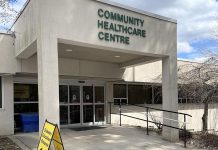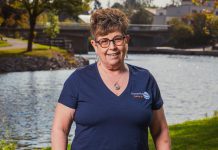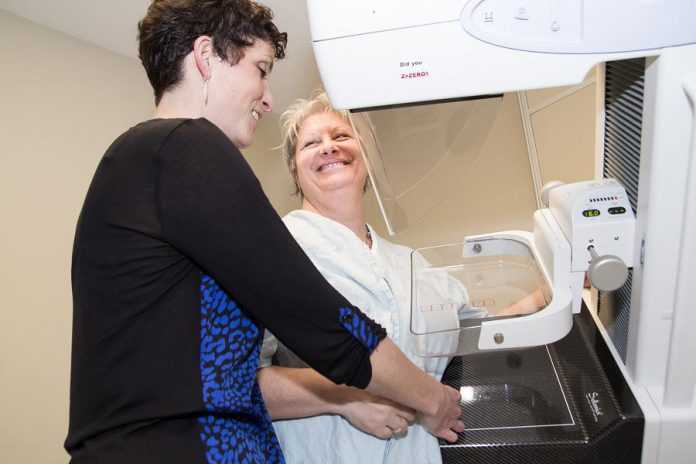
If you’re a woman reading this, the chances are good either you or someone you know will develop breast cancer.
The most recent data from the Canadian Cancer Society suggests that 68 Canadian women were diagnosed with breast cancer each day last year. Next to skin cancer, it is the most common cancer among North American women. And men are not exempt: this year, 220 Canadian men are expected to be diagnosed with breast cancer.
Yet within the difficult statistics, there is hope: while the number of people diagnosed with breast cancer is staggering and increasing, the number of people surviving is also growing.
Some sources indicate that the five-year survival rate for women diagnosed with localized breast cancer (that hasn’t spread beyond the breast) is 98.5 per cent. And according to the Canadian Cancer Society, that’s because of improvements in screening procedures and technology.
None of this is news to Jill Cummings, senior mammography technologist at the Breast Assessment Centre at Peterborough Regional Health Centre (PRHC). She’s seen the value of early detection and regular screening for breast cancer.
“We screen people for breast cancer here every 15 minutes,” she says, pointing to the centre’s screening rooms. “For some, it’s just a stop on their regular health care journey. For others, it might be the beginning of a very long, possibly heartbreaking road, one they hadn’t banked on taking.”
“Either way, improvements in technology, along with the support we’ve received from the community and the dedicated staff we have at the Breast Assessment Centre, means that the journey — whether it’s a brief visit or a new route — is as comfortable and as seamless as possible,” adds Cummings.
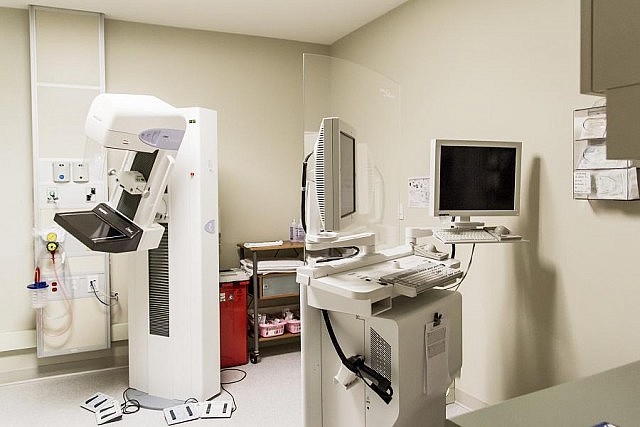
Studies show that regular mammograms for women aged 50 to 74 years reduce the risk of dying from breast cancer. Under the Ontario Breast Screening Program, women in this age group who are at average risk for breast cancer can receive a mammogram once every two years.
If you’re one of these women, you don’t need a referral from a doctor to get a mammogram. You just need to call the Breast Assessment Centre at 705-740-8166 or 1-800-974-4461 (toll free) and an appointment will be booked within two weeks.
Initial screening involves four pictures in all, two of each breast, with the use of a mammography imaging machine. It’s true that the breast is placed between two plates in order to spread the tissue as thinly as possible, and gain fine detail in the image.
It’s uncomfortable for the woman, but only briefly. The technologist who does the screening will also ask the patient for a few pertinent details to add to the file that the radiologist will review.
At PRHC, the radiologist assigned to the Breast Assessment Centre reviews mammograms on site either the same day, or the following day.
“That is a major benefit for most patients,” Cummings says. “They don’t have to wait a long time to hear if they need further investigation.”
She adds it’s common for women to be called back. About one in 10 patients will receive a phone call that says, “The radiologist would like to have an extra look.”
The follow-up appointment is always within three weeks of the first screening and a biopsy, if needed, is done on site the same day.
Cummings says there’s nothing to worry about nine out of 10 times.
Mammograms sometimes show shadows or anomalies when they are, in fact, of no concern. Or, benign growths may be discovered; again, these are of no concern.
And, because the Breast Assessment Centre is staffed with a dedicated radiologist, the patient not only has the follow-up appointment in a timely way, but also receives the result of that second look right away — before they leave the hospital.
“They can rest easily without worry,” Cummings says.
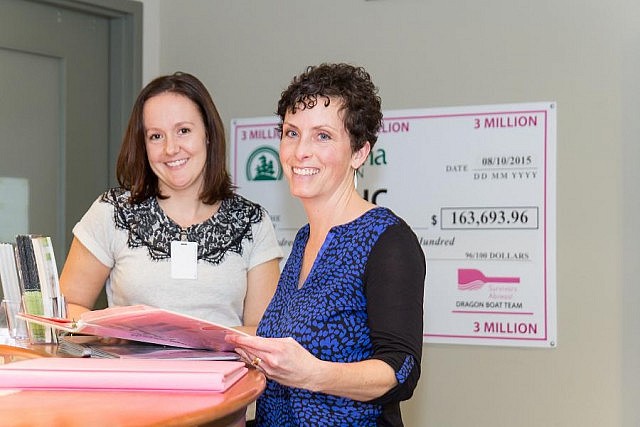
It will mean a visit to the surgeon to learn the next steps. Those could include surgery, radiation, chemotherapy, or a combination of all three — a rapid change in life for both the patient and their family.
Administrators of the Breast Assessment Centre know that navigating the system can be an added burden when a family is already facing a cancer diagnosis. In fact, it can be the one thing a patient simply cannot manage.
So the Breast Assessment Centre offers patients a dedicated companion who they call the “navigator.” Her real name is Lindsey Justynski, and her official title is Breast Health Navigator. Her office is located in the heart of the centre and, even when patients aren’t visiting PRHC, she’s just a phone call away.
“My job is to help each patient maneuver the system,” Justynski explains. That includes sitting with the patient explaining the results and next steps; it can include getting clarity on those next steps. Justynksi also searches out community and web resources — everything, she says, from transportation to appointments, to where to get a mastectomy bra.
“I’m like a real, live breast Google,” she laughs. And then adds that the most important part of her role is to help patients gain confidence in their journey through breast cancer.
“Some want to be connected with community services and some don’t,” she says. “Everyone is different, but everyone can also use a hand at that time in their lives.”
Justynski also organizes annual mammograms and breast magnetic resonance imaging (MRI) for women aged 30 to 69 who are at a high risk for breast cancer because of genetics and other reasons. Under the Ontario Breast Screening Program, women in this high-risk group are referred by their doctor or nurse practioner to a high risk screening site, including PRHC’s Breast Assessment Centre.
The Breast Assessment Centre came together as a centre when the new hospital opened eight years ago. Today, it performs 8,000 mammograms per year — 6,000 breast screenings and 2,000 follow-up procedures — on the centre’s three full-field digital mammography units.
“We’d be nothing without the support of the community,” Cummings says, as she lowers the plate on the mammography unit to show how it works.
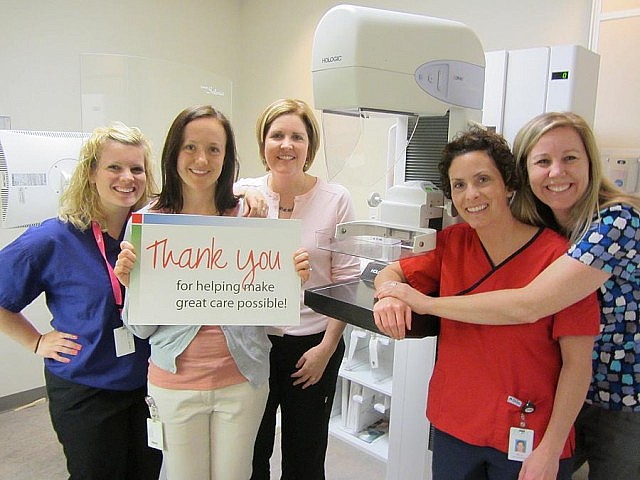
“Donor investment — particularly the support of Survivors Abreast and the thousands of donors, paddlers, sponsors and volunteers who have contributed to Peterborough’s Dragon Boat Festival over the years — has enabled a standard of care in the Breast Assessment Centre on par with the top hospitals across this country,” says Dr. McLaughlin. “It’s helped to drastically decrease wait times for screening, and allowed for the generation of images of the highest quality — empowering our radiologists to make the most precise observations.”
However, due to large volumes in the Breast Assessment Centre since the hospital opened in 2008, as well as increases anticipated as PRHC continues to grow and our population ages, the hospital has identified that three new full-field digital mammography units must be purchased starting later this year in order to ensure that this standard of care remains available in the future.
“We’re turning a need into an opportunity,” Dr. McLaughlin explains. “Our radiologists and diagnostic imaging leaders are always on the lookout for better, faster and more innovative ways to spot this disease early on. This investment will allow us to investigate technological advances in the field such as tomosynthesis — an emerging digital technology for producing high-resolution breast images that early results show may have a higher diagnostic accuracy for certain patient groups.”
“We’ve asked for the support of the PRHC Foundation to help us fund this $1.9 million investment and look forward to working with the community to meet this goal.”
Please give in support of new mammography machines for the Breast Assessment Centre. Your donation will help save the lives of women and men from across our region.
To make a gift, call 705-876-5000 or visit www.prhcfoundation.ca.
All photos by Linda McIlwain / kawarthaNOW except where noted.




